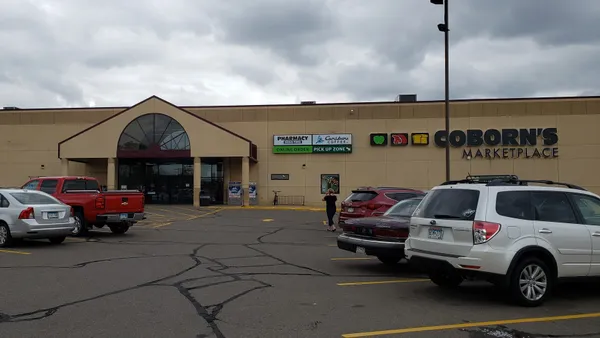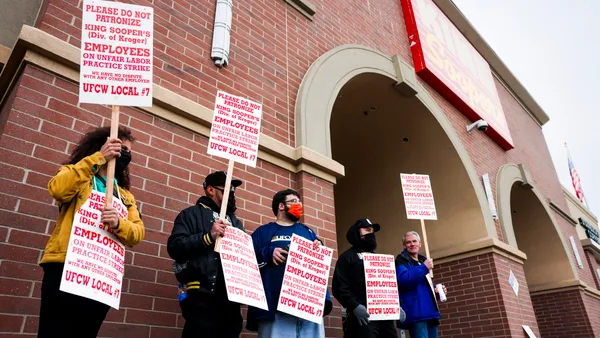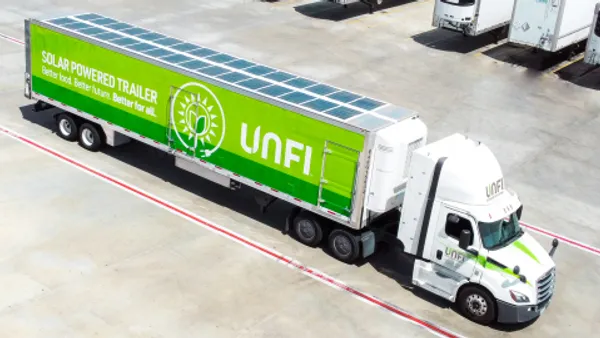Dive Brief:
- SpartanNash announced it will acquire Martin’s Super Markets, which operates 21 stores in northern Indiana and southwest Michigan. Financial terms of the deal were not disclosed. The companies expect the transaction to close in the first quarter of next year.
- Founded in 1947 and with headquarters in South Bend, Indiana, Martin’s has approximately 3,500 employees and reported sales of $450 million for the year ended July 29.
- The acquisition will give SpartanNash 160 retail stores across nine states. The company’s other supermarket brands include Family Fare Supermarkets, D&W Fresh Market, VG’s Grocery, Dan's Supermarket and Family Fresh Market. “Martin’s has been a valued independent retail customer since 2005, and we have the greatest respect for the Martin’s management team and its commitment to their associates, customers, and the communities they serve,” David Staples, president and CEO of SpartanNash, said in a statement.
Dive Insight:
Unlike fellow wholesaler Supervalu, which is in the process of shedding all its retail locations under new owner United Natural Foods, Inc., SpartanNash clearly sees owning retail stores as part of a long-term growth strategy.
With Martin’s, SpartanNash gains a grocer that it knows well, having supplied products to the company for more than a decade. The pickup also gives SpartanNash an established retail brand that operates close to its Grand Rapids, Michigan home base, allowing for supply synergies as well as an ability to keep close tabs on performance, test new retail initiatives and more.
Spartan’s other retail stores are scattered across the Midwest and Plains states, with locations ranging from southeastern Ohio to the western edges of North Dakota and South Dakota. Many stores operate in rural and suburban areas, but Spartan would no doubt like to build its presence in larger markets like South Bend, which has a population just over 100,000. Family Fare, the company’s largest chain with 83 stores, is one of the leading names in Omaha, Nebraska, with more than a dozen locations.
SpartanNash’s retail business could certainly use a boost. Sales in the division have been declining and were down 3.7% in the most recent financial quarter compared to the same period a year ago. Food distribution sales, meanwhile, which are twice as high, rose 4.6% during the same period.
Still, SpartanNash has been investing in its retail stores, remodeling locations — including spending $3 million on a store in Northfield, Minnesota — while also rolling out new private label and e-commerce offerings. The company is unique in building its own e-commerce service, Fast Lane, from the ground up. Home delivery, which launched in summer 2017, is currently in more than two dozen ZIP codes, while pickup is available at 55% of the company’s stores. As president and CEO David Staples noted during the company’s most recent earnings call, half of the company’s click-and-collect customers are new to the company — reflecting its advantage in less competitive rural markets — and average order size is more than $100.
Martin’s also offers its own delivery and store pickup program. Spartan could replace that program with its own, but it seems more likely to keep the brand in place while implementing efficiencies and innovations from Fast Lane.
Looking at the broader industry, this acquisition follows close behind Lidl’s pickup of 27 Best Market stores in the northeast and Schnucks' buy of 19 Shop ‘n Save stores in St. Louis. Meanwhile, Ahold Delhaize CEO Frans Muller hinted that the company is on the hunt for acquisitions to beef up its portfolio of regional brands. As market dynamics continue to get tougher for independent and regional chains, look for consolidation to accelerate in the months and years ahead.
“This transaction is another example of a smaller, family-owned business gaining the benefits of scale from a larger partner with more access to the tools required to compete against alternative grocers such as Amazon, Walmart, Target, Aldi, dollar stores and drug stores,” said Scott Moses, the head of food retail & restaurants investment banking at PJ Solomon, who is advising Martin’s as well as Best Market, which announced its sale to Lidl last week..












